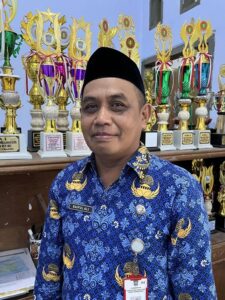Written by Saiful Ali, S.Pd., M.Pd, School Supervisor, Pasrujambe subdistrict, Lumajang district, East Java, Indonesia
(Note: KKG – Kelompok Kerja Guru (Indonesia): a professional learning community for teachers
Cluster: a group of 3-8 neighbouring schools)
Teacher Working Groups (KKG) are vital platforms that support the ongoing development of practices among teachers. In the Pasrujambe subdistrict of Lumajang district, cluster-based KKG activities had been thriving by the start of 2020. These groups regularly organised sessions to share teaching-related information, conduct training sessions, and exchange best practices. Their goal is to continuously improve teaching methods, cater to student needs and enhance overall student learning experiences.
However, what had been functioning smoothly seemed to falter and lose direction with the onset of the Covid-19 pandemic. The activities in the cluster-based KKGs experienced a significant decline, with previously routine activities no longer being prioritised. The activities in several clusters had been sporadic, lacking clear direction in their programmes. Others showed little to no progress.
As a supervisor responsible for supporting and supervising teachers to improve their practice, I understand the importance of KKG activities. Given this situation, I couldn’t remain idle. I coordinated and encouraged the cluster-based KKGs to mobilise and reintroduce the activities they once had done. However, progress seemed elusive, with no significant developments.

After a year of little progress, a glimmer of hope appeared. A partnership between the local government and Bakti Barito-STiR has been expanded to include Pasrujambe subdistrict. This programme, which had already been running in 14 other subdistricts within Lumajang district, has now reached our own subdistrict. January 2024 marked a meaningful moment as I witnessed the cluster-based KKGs in Pasrujambe finally reactivating the activities they once conducted. Thankfully, these activities revived and assisted us in optimising the cluster-based KKG activities.
Thanks to STiR’s support, we’ve explored important teaching methods like Backward Design, helping us plan for differentiated instruction and digital learning. These methods suit teachers implementing the Emancipated Curriculum, a newly-launched curriculum in Indonesia which focuses on student-centred learning. The curriculum needs to be adapted to local contexts, and teachers need continuous support to implement it. Our discussions in the KKGs are now more fruitful, encouraging the sharing of best practices.
The success of the KKGs lies in their active participation at both cluster and district levels, ensuring the implementation of educational agendas. Looking ahead, the hope is for cluster-based KKGs in our subdistrict to become more active. Each cluster-based KKG should hold at least one activity per month, whether educational or social, involving all KKG members within the respective clusters. Continuously striving to increase collaboration among all cluster-based KKG members fosters innovation and creativity, positively impacting every teacher and school to improve, aligning with the educational priorities of Kabupaten Lumajang.

